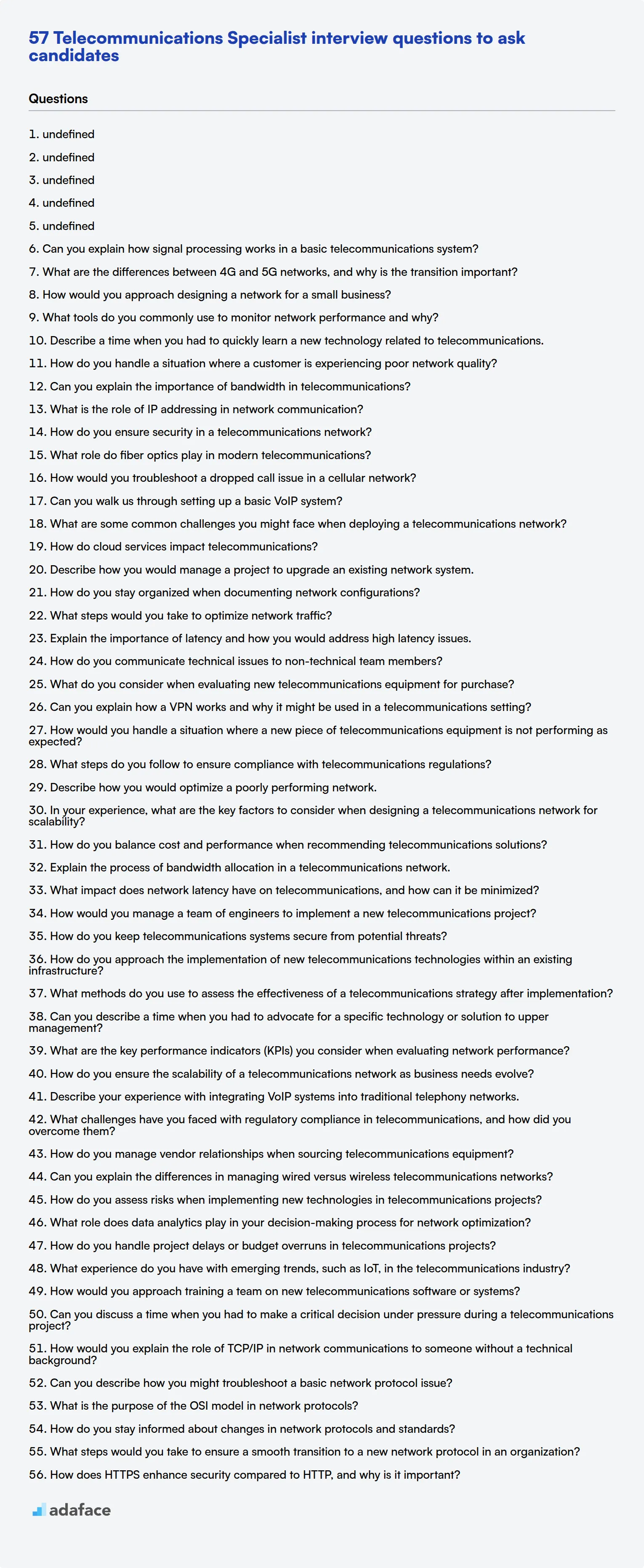Recruiting a talented Telecommunications Specialist can be a challenging task for interviewers who aim to fill pivotal roles in their organizations. So, asking the right questions is vital to ensure candidates possess the necessary technical expertise and skills to handle communication systems effectively, as highlighted in this telecommunications specialist skills guide.
This post provides a comprehensive list of interview questions, categorized by skill level, to help assess the suitability of both junior and senior candidates for Telecommunications Specialist roles. By structuring interviews with these tailored questions, recruiters can ensure a more targeted evaluation of each candidate's expertise.
Implementing this approach, combined with testing candidates using an online assessment, can sharpen your hiring process. It not only streamlines recruitment but also guarantees that you hire talent with authentic capabilities to boost your team's overall efficiency.
Table of contents
Top 5 Telecommunications Specialist questions to ask in interviews
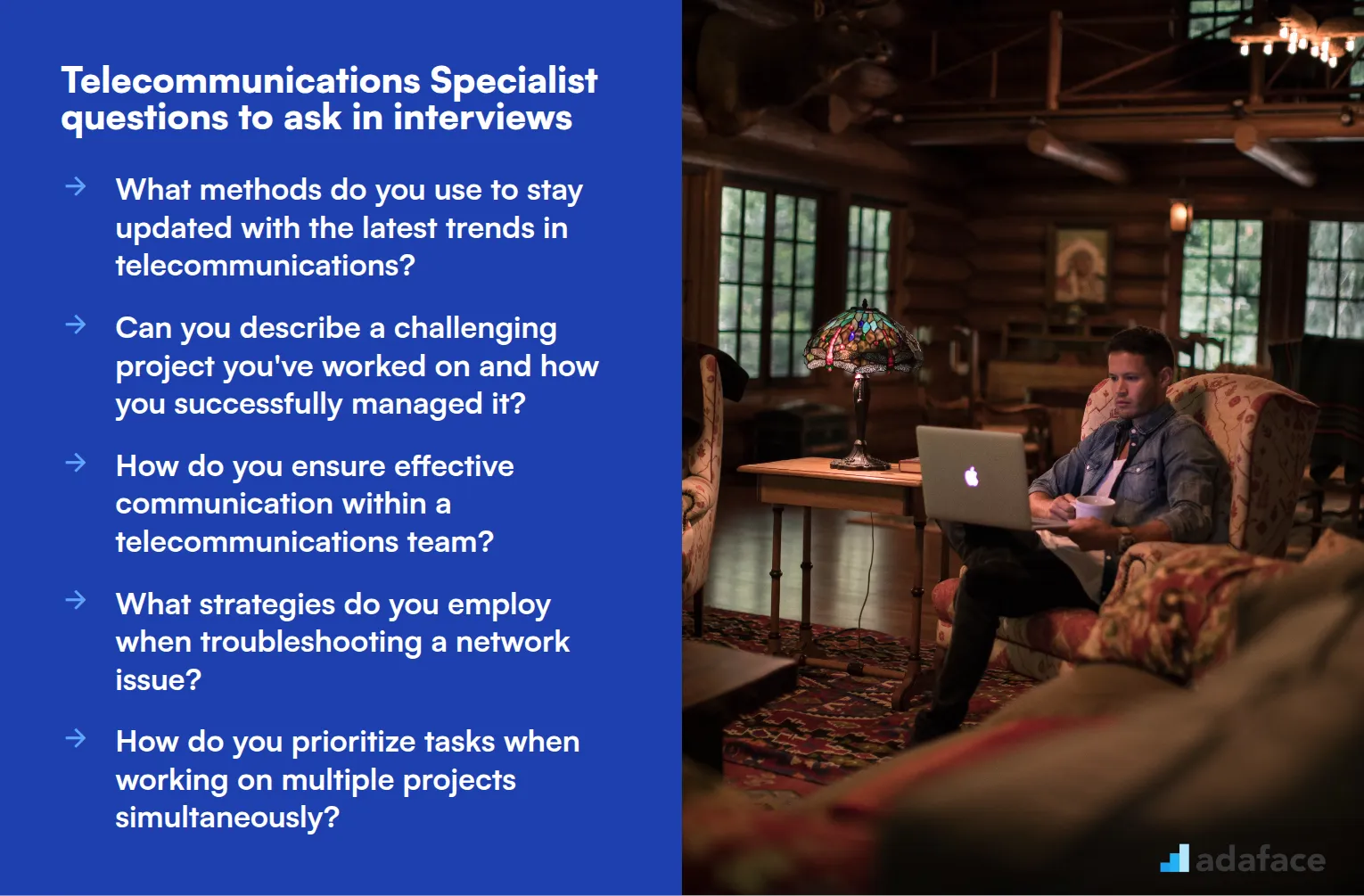
To nail your next hire, it's essential to ask questions that reveal the real potential of candidates. Dive into this curated list of top Telecommunications Specialist interview questions to help you distinguish the seasoned pros from the rookies. These questions are designed to gauge technical know-how while keeping things straightforward and jargon-free.
1. What methods do you use to stay updated with the latest trends in telecommunications?
Candidates should mention utilizing a mix of online resources, industry publications, and professional networks to keep abreast of the latest trends. They might also attend webinars, workshops, or conferences related to telecommunications.
Look for responses that indicate a proactive approach to learning and adaptability in a rapidly evolving field. An ideal candidate should demonstrate a passion for continuous learning and staying ahead in the industry.
2. Can you describe a challenging project you've worked on and how you successfully managed it?
Candidates should provide specific examples of past projects that were challenging due to factors like tight deadlines, complex technology, or team coordination issues. They should explain the steps they took to address these challenges, including planning, communication, and problem-solving strategies.
An ideal response will include a clear articulation of their role in the project, the actions they took to overcome obstacles, and the project's successful outcome. Look for evidence of leadership, teamwork, and a results-oriented mindset.
3. How do you ensure effective communication within a telecommunications team?
Effective communication within a telecommunications team can be achieved through regular meetings, clear documentation of processes, and utilizing collaboration tools. Candidates might also mention fostering an open environment where team members feel comfortable sharing ideas and concerns.
Strong answers should reflect an understanding of the importance of clear and concise communication in preventing misunderstandings and ensuring project success. Look for candidates who stress the value of both verbal and written communication skills.
4. What strategies do you employ when troubleshooting a network issue?
Candidates should outline a systematic approach to troubleshooting, starting with identifying and understanding the problem, gathering relevant data, analyzing potential causes, and implementing solutions. They may also mention using specific tools or methodologies to aid in the process.
An ideal candidate will demonstrate logical thinking and a methodical approach to problem-solving. Look for responses that highlight their ability to remain calm under pressure and effectively troubleshoot complex issues.
5. How do you prioritize tasks when working on multiple projects simultaneously?
Managing multiple projects requires efficient task prioritization. Candidates might discuss using project management tools, setting clear goals, and defining deadlines to organize their workload. They may also highlight the importance of communication and flexibility in adapting to changing priorities.
Look for answers that showcase strong organizational skills and the ability to manage time effectively. An ideal candidate will demonstrate a balanced approach to task management, ensuring all projects receive the necessary attention.
20 Telecommunications Specialist interview questions to ask junior engineers
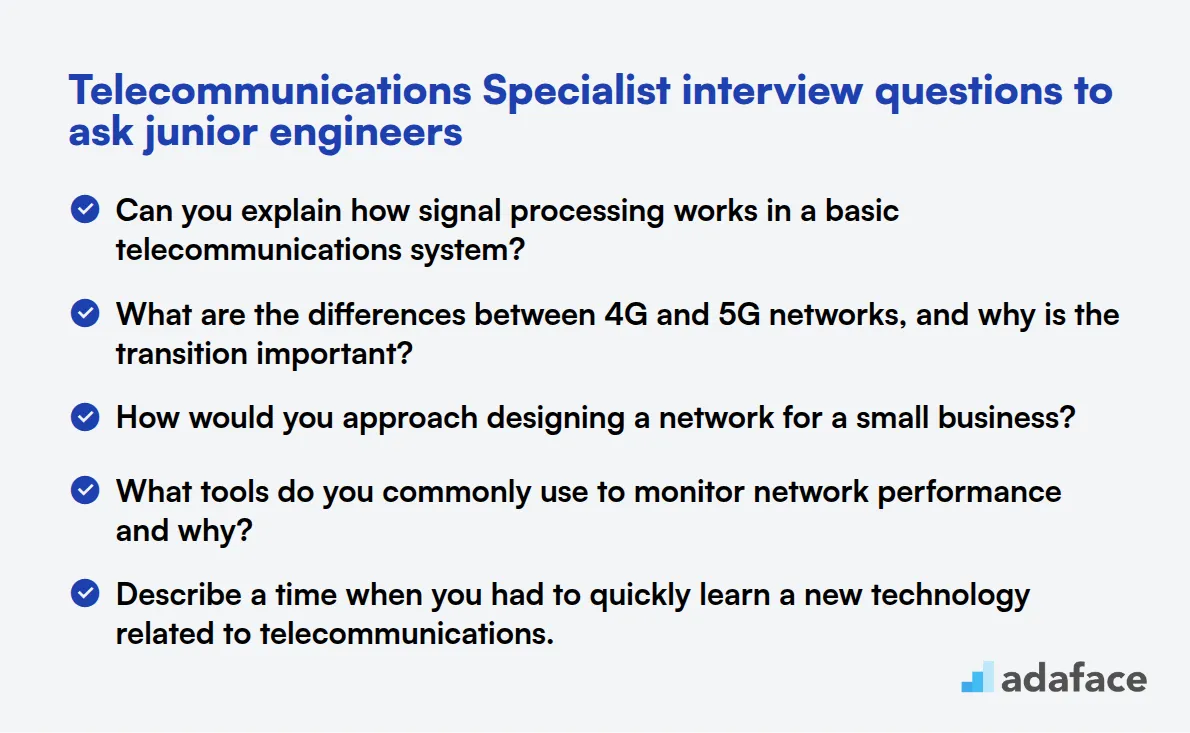
To ensure you hire the right talent for your team, it's crucial to ask thoughtful questions that reveal a candidate's true potential. Use these targeted questions to evaluate junior telecommunications engineers and gain insights into their problem-solving skills and technical knowledge. For a deeper understanding of the role, you can also check out this telecommunications specialist job description.
- Can you explain how signal processing works in a basic telecommunications system?
- What are the differences between 4G and 5G networks, and why is the transition important?
- How would you approach designing a network for a small business?
- What tools do you commonly use to monitor network performance and why?
- Describe a time when you had to quickly learn a new technology related to telecommunications.
- How do you handle a situation where a customer is experiencing poor network quality?
- Can you explain the importance of bandwidth in telecommunications?
- What is the role of IP addressing in network communication?
- How do you ensure security in a telecommunications network?
- What role do fiber optics play in modern telecommunications?
- How would you troubleshoot a dropped call issue in a cellular network?
- Can you walk us through setting up a basic VoIP system?
- What are some common challenges you might face when deploying a telecommunications network?
- How do cloud services impact telecommunications?
- Describe how you would manage a project to upgrade an existing network system.
- How do you stay organized when documenting network configurations?
- What steps would you take to optimize network traffic?
- Explain the importance of latency and how you would address high latency issues.
- How do you communicate technical issues to non-technical team members?
- What do you consider when evaluating new telecommunications equipment for purchase?
10 intermediate Telecommunications Specialist interview questions and answers to ask mid-tier engineers.
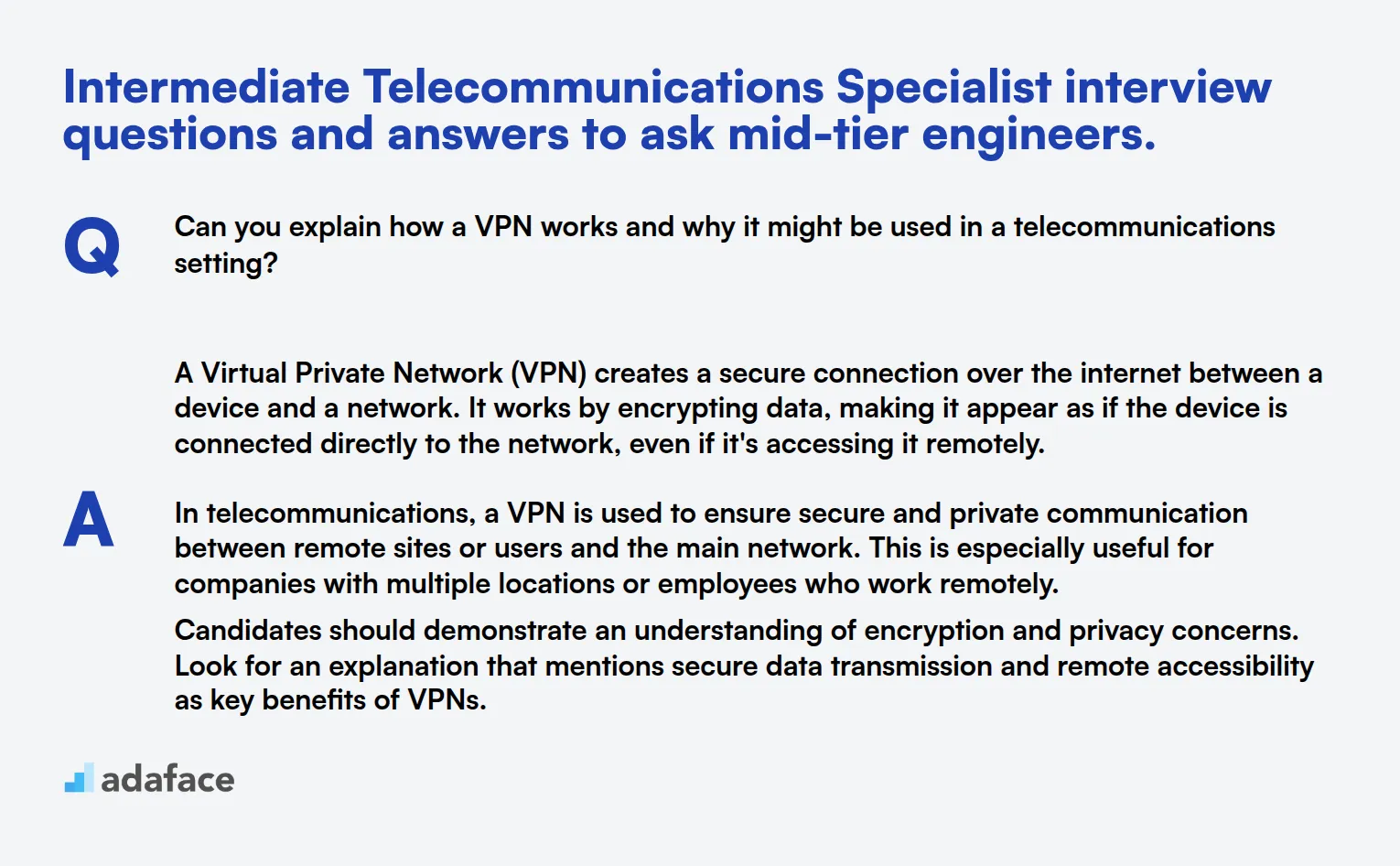
Looking to weed out the middle-ground magicians from your pool of telecommunications talent? These intermediate questions are just what you need to dig a little deeper and discover the engineers who have what it takes to tackle complex challenges head-on. Perfect for those moments when you want to ensure your candidates have the right blend of technical know-how and problem-solving prowess.
1. Can you explain how a VPN works and why it might be used in a telecommunications setting?
A Virtual Private Network (VPN) creates a secure connection over the internet between a device and a network. It works by encrypting data, making it appear as if the device is connected directly to the network, even if it's accessing it remotely.
In telecommunications, a VPN is used to ensure secure and private communication between remote sites or users and the main network. This is especially useful for companies with multiple locations or employees who work remotely.
Candidates should demonstrate an understanding of encryption and privacy concerns. Look for an explanation that mentions secure data transmission and remote accessibility as key benefits of VPNs.
2. How would you handle a situation where a new piece of telecommunications equipment is not performing as expected?
The first step would be to thoroughly review the equipment's setup and configuration. Ensuring it has been installed according to the manufacturer's guidelines is crucial. If issues persist, I would conduct a series of diagnostic tests to pinpoint any faults or misconfigurations.
If the problem is still unresolved, consulting the equipment's documentation or reaching out to the vendor's support team for further assistance would be necessary. Keeping a detailed log of the troubleshooting steps taken is also key to providing a clear record of attempts to resolve the issue.
An ideal response includes the candidate's ability to systematically approach technical problems, their attention to detail in following setup instructions, and their willingness to seek out external resources when needed.
3. What steps do you follow to ensure compliance with telecommunications regulations?
Ensuring compliance starts with staying up-to-date on the latest regulations and standards in the telecommunications industry. Regularly reviewing these guidelines helps in understanding what is required for compliance at both national and international levels.
Implementing regular audits of telecommunications systems to ensure they meet all regulatory requirements is essential. Training staff on compliance-related procedures and maintaining detailed records of compliance activities are also important steps.
Strong candidates will mention the importance of staying informed about regulatory changes and demonstrate a proactive approach to compliance through audits and staff training.
4. Describe how you would optimize a poorly performing network.
Optimizing a network begins with identifying the root cause of the poor performance. This involves analyzing network traffic, checking for bottlenecks, and assessing hardware performance.
Once the issues are identified, I would implement solutions such as load balancing, upgrading outdated hardware, or optimizing network configurations to improve performance. Continuous monitoring is essential to ensure that the network remains optimized over time.
Look for candidates who emphasize a methodical approach to identifying issues and implementing solutions. Their response should also highlight their commitment to ongoing network monitoring and improvement.
5. In your experience, what are the key factors to consider when designing a telecommunications network for scalability?
When designing a scalable telecommunications network, it's important to consider factors such as bandwidth capacity, upgrade paths for hardware, and the ability to accommodate increasing traffic loads without significant changes to the infrastructure.
Using modular components and scalable architecture can help ensure that the network can grow with the organization's needs. Planning for future growth by implementing flexible and adaptable network solutions is also critical.
Candidates should mention the importance of planning for future growth and flexibility in network design. Look for an understanding of scalable architecture principles and the ability to adapt to changing demands.
6. How do you balance cost and performance when recommending telecommunications solutions?
Balancing cost and performance involves understanding the organization's budget constraints while also ensuring that the recommended solution meets performance requirements. This may involve prioritizing essential features and components that provide the most value.
Evaluating the total cost of ownership, including maintenance and potential upgrades, is crucial. I would also consider the long-term benefits of investing in higher-quality equipment that may offer better performance and reliability.
A good response will show the candidate's ability to perform cost-benefit analyses and make strategic decisions that prioritize both performance and budget considerations.
7. Explain the process of bandwidth allocation in a telecommunications network.
Bandwidth allocation involves distributing available bandwidth across different network segments and services to ensure optimal performance. This process requires analyzing network traffic and prioritizing critical applications and services.
Techniques such as Quality of Service (QoS) can be used to manage bandwidth allocation by giving priority to certain types of traffic. Regular monitoring and adjustments may be needed to maintain optimal network performance.
Applicants should demonstrate an understanding of traffic analysis and prioritization techniques. Look for candidates who mention QoS and emphasize the importance of ongoing monitoring and adjustments.
8. What impact does network latency have on telecommunications, and how can it be minimized?
Network latency is the delay in data transmission over a network, which can significantly affect telecommunications performance, especially for real-time applications like VoIP or video conferencing.
Minimizing latency involves optimizing network paths, using high-speed connections, and implementing network optimization techniques such as caching and data compression. Regularly monitoring network performance can also help identify and address latency issues promptly.
An ideal response will include practical strategies for reducing latency and an understanding of its impact on network performance. Look for candidates who emphasize the importance of continuous monitoring and proactive management.
9. How would you manage a team of engineers to implement a new telecommunications project?
Managing a team for a new project involves clear communication and setting measurable goals. I would start by defining the project's scope and objectives, then assign roles and responsibilities based on each team member's strengths and expertise.
Regular check-ins and progress updates ensure that the team stays on track. Encouraging collaboration and open communication is crucial for addressing any challenges or roadblocks that may arise during the project.
Candidates should show leadership skills and the ability to coordinate effectively. Look for an understanding of the importance of roles and responsibilities, communication, and team dynamics.
10. How do you keep telecommunications systems secure from potential threats?
Keeping telecommunications systems secure involves implementing multi-layered security measures, such as firewalls, encryption, and intrusion detection systems, to protect against unauthorized access and potential threats.
Regularly updating software and hardware to patch vulnerabilities, conducting security audits, and training staff on security best practices are essential components of a secure telecommunications system.
Strong candidates will demonstrate a comprehensive approach to security, highlighting the importance of regular updates, audits, and staff training. Look for an understanding of both technical and human factors in security.
15 advanced Telecommunications Specialist interview questions to ask senior engineers
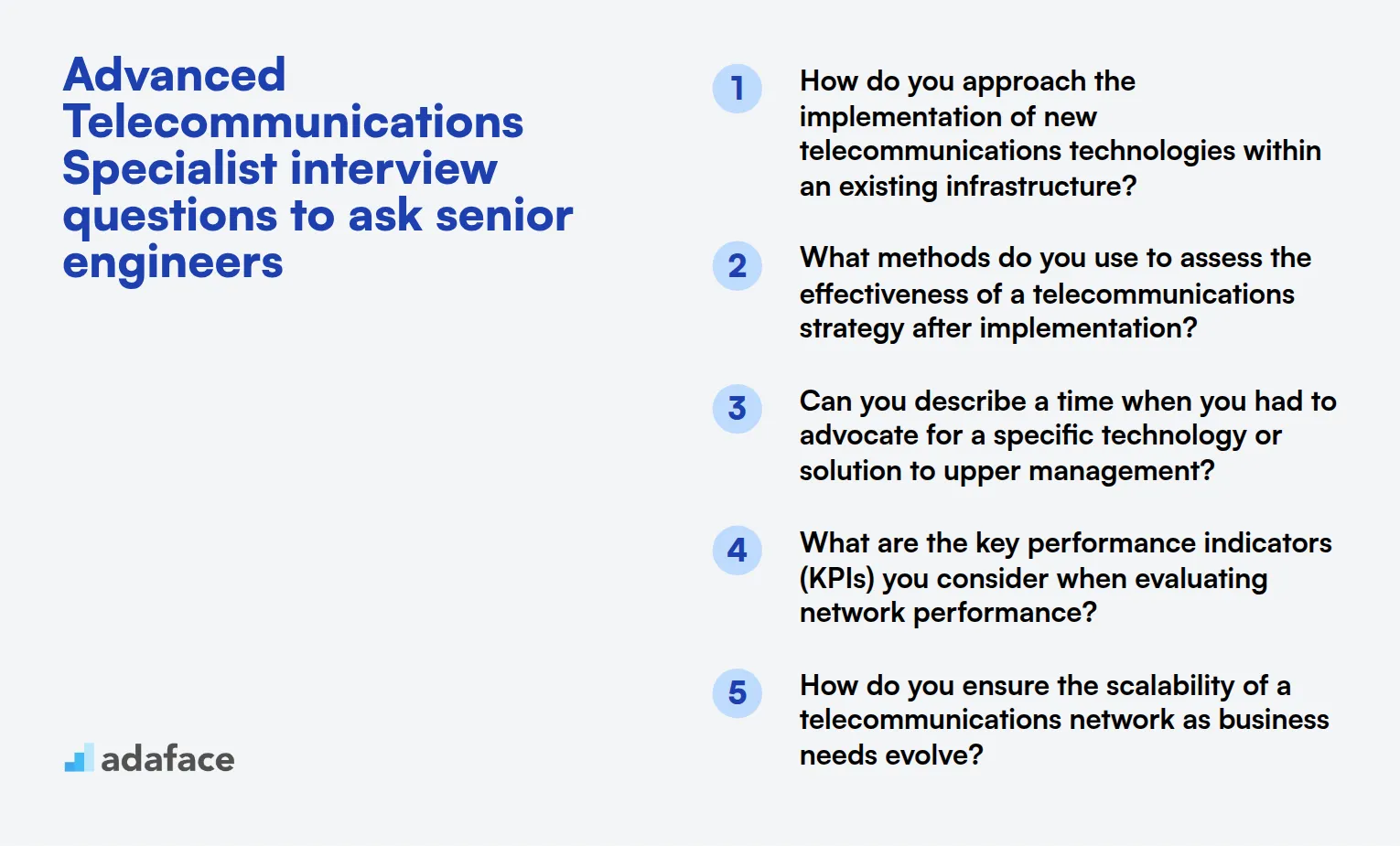
To evaluate the advanced skills of candidates, use these questions to assess their technical knowledge and strategic thinking in telecommunications. This list can be particularly useful during final interviews, where deeper understanding and problem-solving abilities are key. For a comprehensive understanding of the role, refer to the telecommunications specialist job description.
- How do you approach the implementation of new telecommunications technologies within an existing infrastructure?
- What methods do you use to assess the effectiveness of a telecommunications strategy after implementation?
- Can you describe a time when you had to advocate for a specific technology or solution to upper management?
- What are the key performance indicators (KPIs) you consider when evaluating network performance?
- How do you ensure the scalability of a telecommunications network as business needs evolve?
- Describe your experience with integrating VoIP systems into traditional telephony networks.
- What challenges have you faced with regulatory compliance in telecommunications, and how did you overcome them?
- How do you manage vendor relationships when sourcing telecommunications equipment?
- Can you explain the differences in managing wired versus wireless telecommunications networks?
- How do you assess risks when implementing new technologies in telecommunications projects?
- What role does data analytics play in your decision-making process for network optimization?
- How do you handle project delays or budget overruns in telecommunications projects?
- What experience do you have with emerging trends, such as IoT, in the telecommunications industry?
- How would you approach training a team on new telecommunications software or systems?
- Can you discuss a time when you had to make a critical decision under pressure during a telecommunications project?
7 Telecommunications Specialist interview questions and answers related to network protocols
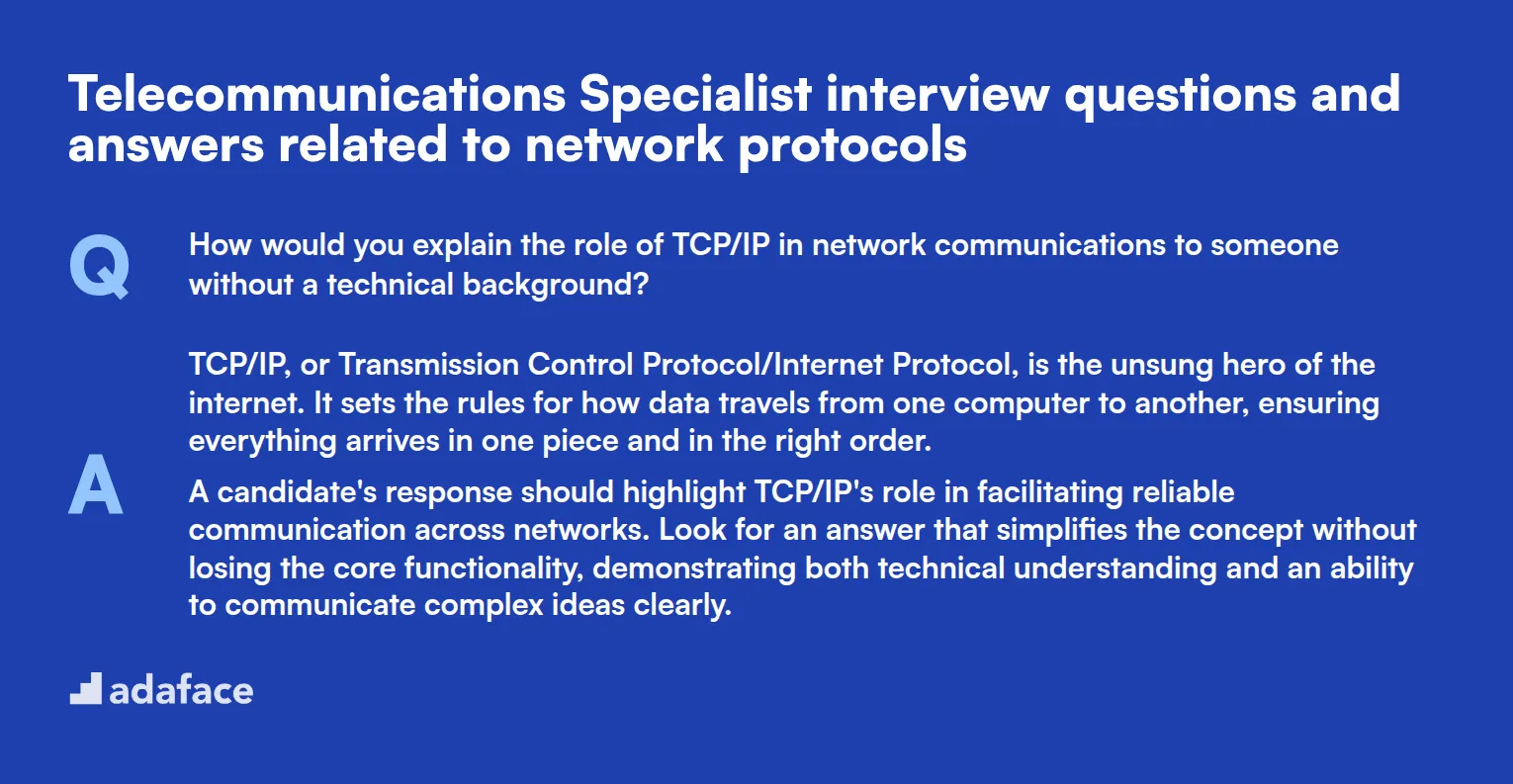
When venturing into the labyrinth of network protocols, it's crucial to have a trusty guide. This set of interview questions is designed to help unravel the mysteries of network protocols, ensuring you spot the right Telecommunications Specialist for your team. Use these questions to dig into candidates' practical knowledge and their ability to navigate the ever-evolving landscape of telecommunications.
1. How would you explain the role of TCP/IP in network communications to someone without a technical background?
TCP/IP, or Transmission Control Protocol/Internet Protocol, is the unsung hero of the internet. It sets the rules for how data travels from one computer to another, ensuring everything arrives in one piece and in the right order.
A candidate's response should highlight TCP/IP's role in facilitating reliable communication across networks. Look for an answer that simplifies the concept without losing the core functionality, demonstrating both technical understanding and an ability to communicate complex ideas clearly.
2. Can you describe how you might troubleshoot a basic network protocol issue?
Troubleshooting network protocols often starts with identifying the problem area, such as connectivity issues or data loss. Once pinpointed, I'd check for common culprits like misconfigured settings or faulty network devices.
An ideal candidate will lay out a logical troubleshooting process, showing methodical thinking and practical experience. They should mention tools or techniques they would use, like packet sniffers or protocol analyzers, to diagnose and resolve issues.
3. What is the purpose of the OSI model in network protocols?
The OSI model is like a detailed map for network communication. It breaks down the process into seven layers, each with a specific function, from the physical connections to the application level, ensuring different systems can communicate smoothly.
Look for an answer that shows an understanding of how the OSI model helps standardize communication processes. The candidate should be able to explain why each layer is important and how it helps in diagnosing network issues.
4. How do you stay informed about changes in network protocols and standards?
Staying updated involves regularly checking resources like industry publications, forums, and professional networks. Attending webinars and conferences can also provide insights into the latest protocol developments.
A candidate who actively engages with professional communities and keeps up with industry trends is valuable. Their answer should reflect a proactive approach to continuous learning and adaptability to new technologies.
5. What steps would you take to ensure a smooth transition to a new network protocol in an organization?
Ensuring a smooth transition starts with thorough planning. This includes evaluating current systems, conducting risk assessments, and setting up a pilot program. Training staff and clear communication are crucial to address any challenges that arise.
A candidate should demonstrate an understanding of change management principles and the ability to foresee potential hurdles. Look for detailed steps and a strategic approach to implementing protocol changes while minimizing disruptions.
6. How does HTTPS enhance security compared to HTTP, and why is it important?
HTTPS, or Hypertext Transfer Protocol Secure, encrypts data to protect it from eavesdropping, ensuring that the communication between web browsers and servers is secure. It's crucial for safeguarding sensitive information like financial data or personal details.
The candidate should clearly articulate the security benefits of HTTPS over HTTP and why it's essential for privacy and data protection. Look for an understanding of encryption and the role of HTTPS in building user trust and compliance with security standards.
Which Telecommunications Specialist skills should you evaluate during the interview phase?
While one interview cannot cover every aspect of a candidate's skillset, focusing on core competencies is crucial to understanding a Telecommunications Specialist's potential. Evaluating the right skills will provide insight into how well a candidate can manage the intricacies of complex telecommunication systems.
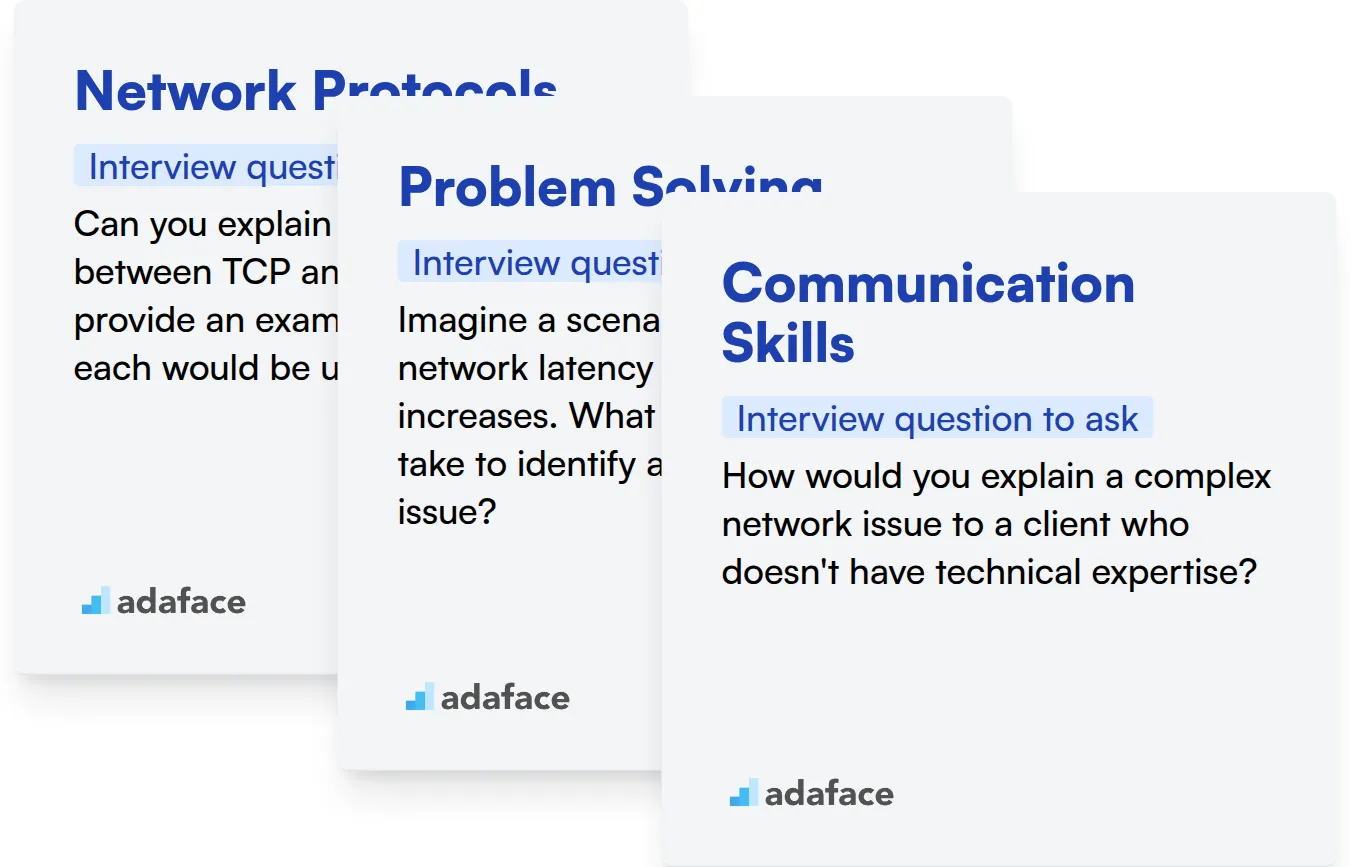
Network Protocols
Consider using an assessment test that includes multiple-choice questions on network protocols, as it can help quickly gauge a candidate's understanding. Our Computer Networks test could be a resource for this.
During interviews, pose targeted questions to assess a candidate's knowledge of network protocols.
Can you explain the difference between TCP and UDP, and provide an example of where each would be used?
Look for answers that highlight the candidate's understanding of the fundamental differences and practical applications of each protocol. An ideal response will provide clear examples that demonstrate their ability to apply their knowledge in real-world scenarios.
Problem Solving
An assessment test with scenarios pertaining to problem-solving can help identify candidates who excel in this area. Our Logical Reasoning test could be beneficial.
Ask questions that present hypothetical issues or challenges related to telecommunications to evaluate problem-solving capabilities.
Imagine a scenario where network latency suddenly increases. What steps would you take to identify and resolve the issue?
Seek responses that outline a methodical approach, showing the candidate's ability to identify the root cause and implement effective solutions. The candidate should demonstrate logical reasoning and a systematic problem-solving strategy.
Communication Skills
Include questions that gauge how well candidates articulate technical concepts to non-technical audiences.
How would you explain a complex network issue to a client who doesn't have technical expertise?
Evaluate the candidate's ability to simplify technical jargon into easily understandable language, reflecting their adeptness at communicating across different levels of technical knowledge.
Hire top talent with Telecommunications skills tests and the right interview questions
When seeking to hire a Telecommunications Specialist, it’s vital to ensure candidates possess the required telecommunications skills. A thorough understanding of network protocols, systems, and technologies is essential for this role.
The most effective way to assess these skills is through targeted skills tests. Consider using our Telecommunications Specialist test to evaluate candidates' proficiency accurately.
Once you have used the test, you can easily shortlist the top applicants and invite them for interviews. This step will streamline your hiring process and help you focus on the most qualified candidates.
To take the next step in your hiring process, visit our test library and explore our range of assessments. You can also sign up to get started immediately.
Network Engineer Online Test
Download Telecommunications Specialist interview questions template in multiple formats
Telecommunications Specialist Interview Questions FAQs
A Telecommunications Specialist should have knowledge of network protocols, troubleshooting skills, understanding of voice and data systems, and familiarity with various telecommunications technologies.
Use a combination of theoretical questions, practical scenarios, and problem-solving tasks to evaluate the candidate's technical knowledge and ability to apply it in real-world situations.
Key topics include network protocols, VoIP systems, fiber optics, wireless technologies, network security, and telecommunications regulations.
Adjust the complexity of questions based on the candidate's experience level. Use basic concepts for junior roles, more advanced topics for mid-tier positions, and complex scenarios for senior roles.

40 min skill tests.
No trick questions.
Accurate shortlisting.
We make it easy for you to find the best candidates in your pipeline with a 40 min skills test.
Try for freeRelated posts
Free resources




